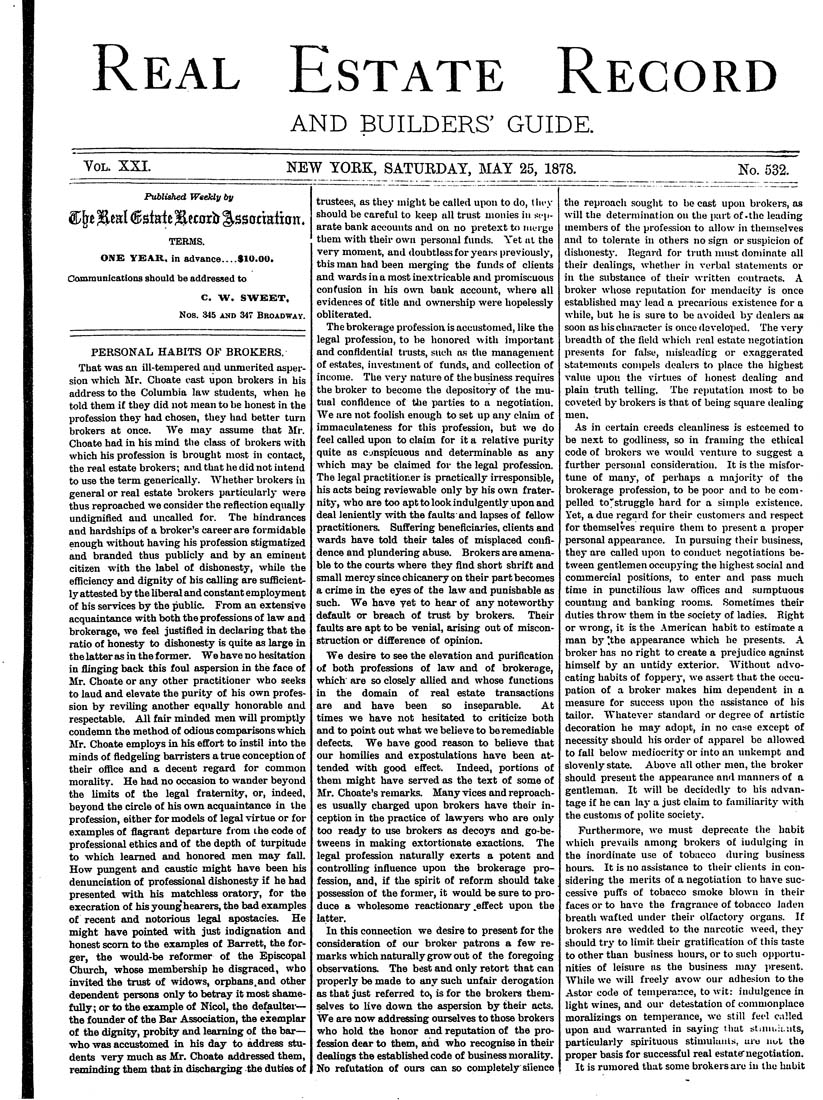Columbia University Libraries Digital Collections: The Real Estate Record
Use your browser's Print function to print these pages.
Real estate record and builders' guide: v. 21, no. 532: May 25, 1878

Text version:
Please note: this text may be incomplete. For more information about this OCR, view About OCR text.
Real Estate Record AND BUILDERS' GUIDE. Vol. XXI. NEW YOEK, SATUEDAY, MAY 25, 1878. No. 532. Published Weekly by ^\t %m\ Estate %ttaxii S^ssocmlion. TERMS. ONE YEAR, in advance....$10.00. Communications should be addressed to C. W. SAVEET, Nos. 345 AND 347 Broadway. personal HABITS OF BROKERS. That was an ill-tempered aud umucrited asper¬ sion which Mr. Clioate east upon brokers in his address to the Columbia law students, when he told them if they did not mean to be honest in the profession they had chosen, they had better turn brokers at once. We may assume that Mr. Choate had in his mind the class of brokers with which his profession is brought most in contact, the real estate brokers; and that he did not intend to use the term generically. Whether brokers in general or real estate brokers particularly were thus reproached we consider the reflection equally undignified and uncalled for. The hindrances and hardships of a broker's career are formidable enough without having his profession stigmatized and branded thus pubUcly and by an eminent citizen with the label of dishonesty, while the efficiency and dignity of his calling are sufficient¬ ly attested by the Uberal and constant employment of his services by tbe public. From an extensive acquaintance with both the professions of law and brokerage, we feel justified in declaring that the ratio of honesty to dishonesty is quite as large in the latter as in the former. We have no hesitation in flinging back this foul aspersion in the face of Mr. Choate or any other practitioner who seeks to laud and elevate the purity of his own profes¬ sion by reviling another equally honorable and respectable. All fair minded men will promptly condemn the method of odious comparisons which Mr. Choate employs in his effort to instil into the minds of fledgeUng barristers a true conception of their office and a decent regard for common morality. He had no occasion to wander beyond the Hmits of the legal fraternity, or, indeed, beyond the circle of his own acquaintance in the profession, either for models of legal virtue or for examples of flagrant departure from ihe code of professional ethics and of the depth of turpitude to which lesuned and honored men may fall. How pimgent and caustic might have been his denunciation of professional dishonesty if he had presented with his matchless oratory, for the execration of his yoimg'hearers, the bad examples of recent and notorious legal apostacies. He might have pointed with just indignation and honest scorn to the examples of Barrett, the for¬ ger, the would-be reformer of the Episcopal Church, whose membership he disgraced, who invited the tnist of widows, orphans^and other dependent persons only to betray it most shame¬ fully; or to the example of Nicol, the defaultei-— the founder of the Bar Association, the exemplar of the dignity, probity and learning of the bar— who was accustomed in his day to address stu¬ dents very much as Mr. Choate addressed them, reminding them that in discharging the duties of trustees, as they might be called upon to do, llu-y should be careful to keep all trust monies in sep¬ arate bank accounts and on no pretext to merge them with their own personal funds. Yet iil the very moment, and doubtles.s for years previously, this man had been merging the funds of clients and wards in a most inextricable and promiscuous confusion in his own bank account, where all evidences of title and o'wnership were hopelessly obliterated. The brokerage profession is accustomed, like the legal profession, to be honored with Important and confidential trasts, such as the management of estates, inve.